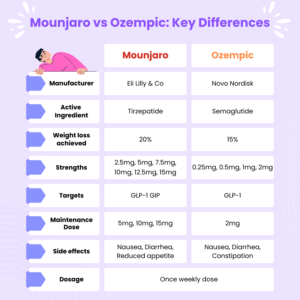You can switch from Ozempic to Mounjaro because Ozempic is not a weight loss injection. However, Mounjaro has recently been approved to treat chronic weight management in the UK.
Ozempic is licensed to treat type 2 diabetes and if you’re using it off-label for weight loss, it’s time to consider other weight loss injections such as Mounjaro and Wegovy.
Switching from one medication to another is not as simple as you might think. It should be done after consulting with your healthcare provider. In this comprehensive guide, you will get to know some important factors to consider before switching from Ozempic to Mounjaro, dosage schedules, and which medicine is right for you.
Mounjaro – A Weight Loss Injection
Mounjaro is a new weight loss injection launched in 2024. It is a prescription-only medicine used to treat chronic weight management and type 2 diabetes.
It works by activating two receptors, GIP and GLP, simultaneously, helping you eat less and making it easier to lose weight. Moreover, the active ingredient, Tirzepatide, also makes insulin work better in controlling sugar levels and reducing fat.
Get Mounjaro Private Prescription
Ozempic – Type 2 Diabetes Injection
Ozempic is a prescription-only injection licensed to treat type 2 diabetes but has gained popularity for its effectiveness in promoting weight loss. That is why it is used off-label in the UK for weight loss. It also lowers the risk of heart attack and stroke in people with type 2 diabetes and heart disease
It mimics the incretin hormones, which help regulate blood sugar levels and insulin secretion.
Why Should You Switch from Ozempic to Mounjaro?
The basic reason for switching from Ozempic to Mounjaro is its eligibility criteria. Ozempic is licensed for type 2 diabetes; Mounjaro is licensed for weight loss.
Studies show that Mounjaro helps people lose more weight than Ozempic. The strongest dose of Mounjaro can lead to nearly twice as much weight loss as Ozempic in 40 weeks.
You can obtain a private prescription for Mounjaro if your BMI is 30 or above, or if your BMI is 27 and you have a weight-related health condition such as type 2 diabetes, high blood pressure, or high cholesterol.
Ozempic vs Mounjaro: Which is More Effective for Weight Loss?
In a randomised clinical trial, 1,867 individuals with type 2 diabetes were compared to see how well different doses of Mounjaro (5 mg, 10 mg, and 15 mg) worked compared to Ozempic 1 mg.
The study found that after 40 weeks:
– Ozempic led to an average weight loss of 6.7%.
– Mounjaro 5 mg led to 8.5% weight loss on average.
– Mounjaro 10 mg led to 11% weight loss on average.
– Mounjaro 15 mg led to 13.1% weight loss on average.
These results suggest that Mounjaro can lead to more weight loss than Ozempic, especially at higher doses.

Factors to Consider Before Switching
There are some critical factors to consider before switching between Ozempic and Mounjaro.
Consultation with Your Healthcare Provider
Before making any changes to your medication regimen, it is essential to consult with your healthcare provider. They can provide personalised advice based on your medical history and current health status.
Dosage Difference
Ozempic and Mounjaro have different strengths and mechanisms of action. For example, Ozempic has 3 strengths, starting from 0.25mg and titrating up to 1mg. On the other hand, Mounjaro has 6 strengths, starting from 2.5 mg, and 3 maintenance dosages: 5 mg, 10 mg, and 15 mg.
Dosage Schedule
Ozempic and Mounjaro are both once-weekly injections. When switching from Ozempic to Mounjaro, you have to consider your current dosage. For example, if you’re currently taking 1mg of Ozempic and considering switching to Mounjaro, you have to start with its minimum dosage, which is 2.5mg.
In some cases, your healthcare provider might advise you to switch to 5 mg. Your provider will determine which dosage is safe for you to transition to.
Side Effects
Like any medication, Ozempic and Mounjaro have some common side effects.
– Abdominal pain
– Constipation
– Diarrhea
– Nausea
– Vomiting
These side effects are usually mild and tend to diminish as your body adjusts to the medication.
Switching Process
It’s important to get rid of Semaglutide from your body before switching to Tirzepatide. Ozempic takes about 5 weeks after your last dose to leave your system completely.
For instance, If you injected Ozempic on Friday of a particular week, you would take a 5-week break and then switch to Mounjaro. You should start with a dose of 2.5mg, though sometimes you might be advised to start at a slightly higher dosage. It depends on how your body responds to the medicine.
Manage Side Effects
Weight loss injections are additional tools for weight management and should not be considered lifelong solutions. If Mounjaro causes digestive issues such as stomach upset, diarrhoea, or constipation, try taking it with food or adjusting the timing of your doses. Eating a balanced diet with fibre-rich foods can also help regulate digestion.
Monitor Your Progress
During the transition period, regularly monitor your weight, blood sugar levels, and overall health. Keep notes to track any changes and share this information with your healthcare provider.
Lifestyle Adjustments
A balanced diet plays a significant role in Mounjaro’s effectiveness. Focus on nutrient-dense foods such as fruits, vegetables, lean proteins, and whole grains. Avoid high-fat and high-sugar foods, which can counteract the medication’s benefits.
Incorporating regular physical activity into your routine can enhance the weight loss effects of Mounjaro. Aim for at least 150 minutes of moderate-intensity exercise per week, such as brisk walking, cycling, or swimming.
Get Private Prescription for Weight Loss Injections
If you want to switch from Ozempic to Mounjaro, book an online consultation with our healthcare professionals at The Care Pharmacy Weight Loss Clinic. After the consultation, your weight loss medication will be delivered to your doorstep for free, and you won’t have to travel to pick it up from the store.
